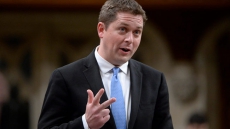Renowned British physicist Professor Stephen Hawking, who shaped modern cosmology and inspired millions despite suffering from a life-threatening condition, died on Wednesday -- leaving millions in mourning globally. He was 76.
His family released a statement in the early hours of Wednesday confirming his death at his home in Cambridge.
"We are deeply saddened that our beloved father passed away today. He was a great scientist and an extraordinary man whose work and legacy will live on for many years," Hawking's children said in a statement.
"His courage and persistence with his brilliance and humour inspired people across the world. He once said, It would not be much of a universe if it wasn't home to the people you love.' We will miss him for ever," the statement added.
Hawking is survived by three children -- Robert, Lucy and Timothy -- from his first marriage to Jane Wilde, and three grandchildren.
The physicist was born on January 8, 1942 in Oxford, England.
Known the world over for his acclaimed book "A Brief History of Time: From the Big Bang to Black Holes", Hawking was diagnosed with amyotrophic lateral sclerosis (ALS) -- a progressive neuro-degenerative disease -- in 1963 at age 21, The Guardian newspaper said.
Hawking's doctors gave him nearly two years to live but he defied medical history and survived for decades.
For the rest of his life, the physicist used a wheelchair to move around and a speech synthesizer that allowed him to speak in a computerised voice with an American accent.
For Hawking, the early diagnosis of his terminal disease ignited a fresh sense of purpose.
"Although there was a cloud hanging over my future, I found, to my surprise, that I was enjoying life in the present more than before. I began to make progress with my research," he once said, the paper reported.
"My goal is simple. It is a complete understanding of the universe, why it is as it is and why it exists at all," Hawking added.
With fellow physicist Roger Penrose, Hawking merged Einstein's theory of relativity with quantum theory, suggesting that space and time began with the Big Bang and end in black holes.
In 1974, Hawking proposed what is known as his most significant theory that black holes can emit sub-atomic particles.
Published for the first time in 1988, "A Brief History of Time" stayed on the Sunday Times bestsellers list for an unprecedented 237 weeks. It sold 10 million copies and was translated into 40 different languages.
Hailed as one of the most brilliant theoretical physicists since Albert Einstein, Hawking never won a Nobel Prize.
In India, President Ram Nath Kovind, Prime Minister Narendra Modi and Science Minister Harsh Vardhan condoled the demise of Hawking.
"Sad to hear of the passing of scientist Stephen Hawking. His brilliant mind made our world and our universe a less mysterious place. And his courage and resilience will remain an inspiration for generations," Kovind said in a tweet.
Modi also took to Twitter to pay tribute to Hawking and said: "Professor Stephen Hawking was an outstanding scientist and academic".
It was January 2001 when Hawking came to India for the first time, later describing the 16-day long tour as "magnificent".
In the first leg of the tour in Mumbai, Hawking addressed an international physics seminar at the Tata Institute of Fundamental Research (TIFR). The physicist also celebrated his 59th birthday at the Oberoi Towers hotel where he stayed.
In New Delhi, Hawking met then President K.R. Narayanan at Rashtrapati Bhavan who later described the 45-minute meeting with the British physicist as "an unforgettable experience".
The US space agency NASA tweeted: "Remembering Stephen Hawking, a renowned physicist and ambassador of science. His theories unlocked a universe of possibilities that we & the world are exploring. May you keep flying like superman in microgravity, as you said to astronauts on @Space_Station in 2014".
"We lost a great one today. Stephen Hawking will be remembered for his incredible contributions to science -- making complex theories and concepts more accessible to the masses," tweeted Microsoft CEO Satya Nadella.
Astrophysicist Dr Karan Jani, who works for the Laser Interferometer Gravitational-Wave Observatory (LIGO), wrote: "The courage for a career in astrophysics happened due to Brief History of Time - a used copy that I got from a street vendor in my small town of [India] 12 yrs ago."
"A loss for all humanity. RIP Stephen Hawking," tweeted American astronaut Scott Kelly.
The physicist's inspiring story gave birth to the 2014 movie "The Theory of Everything," which was based on a memoir by Hawking's first wife Wilde. Actor Eddie Redmayne's portrayal of Hawking in the film won him an Oscar for Best Actor.
From Hollywood to Bollywood, condolences poured in for Hawking.
While actor Eddie Redmayne remembered him as a "ladies man", the official Twitter account of "The Big Bang Theory", a TV series that witnessed appearances of the famed professor, also remembered him.
"RIP Stephen Hawking. A major loss to the scientific community and to the millions he inspired through his work and life. Condolences to the family," tweeted actor-producer Farhan Akhtar.
Oscar-winning sound designer Resul Pookutty said: "Remember to look up at the stars not down at your feet"! A sad day for all of us".
TRIUMPH OF SPIRIT OVER FORM: THE EXTRAORDINARY LIFE AND CAREER OF STEPHEN HAWKING
During those years, though confined to a wheel-chair and only able to communicate via a special voice synthesising apparatus, his prodigious mind roamed around the cosmos, attempting to solve its mysteries -- from black holes to quantum gravity.
How can we describe Stephen William Hawking? He was termed as the greatest scientist since Albert Einstein but declined to be so categorised -- only accepting he was, at best, the greatest since the safe-cracking, bongo drum-playing, Nobel-winning Richard Feynman. It was only after meeting Feynman in 1979 that Hawking propounded his theory of the creation of the universe at -- of all places -- the Vatican.
The 76-year-old Hawking has done the most in recent times to popularise science, not only by what he achieved despite his condition, but his sterling contribution across a wide swathe of astrophysics. He is the only scientist (or person for that matter) who appeared, as himself, on a range of TV shows spanning "The Simpsons", "Futurama", "The Big Bang Theory", "Star Trek", "Doctor Who" and even a "Monty Python" reunion.
The physicist's inspiring story gave birth to the 2014 movie "The Theory of Everything," which was based on a memoir by Hawking's first wife Wilde.
But above everything he conceived or contributed to his chosen field, Hawking was a living embodiment of mind over matter, the triumph of spirit over form, and of resilience over trying adversity, which he faced with his unique brand of optimism and typically British humour and understatement. He used to introduce himself: "Hello. I am Stephen Hawking. Physicist, cosmologist, and something of a dreamer. Although I cannot move and I have to speak through a computer, in my mind I am free."
Born in Oxford on January 8, 1942 to a pair of highly-intelligent but not very well-to-do parents, Hawking did not particularly distinguish himself in his early academic life, and it was only while an undergraduate at Oxford, did he begin to make his mark. Despite being diagnosed in his first year as a doctoral student with incurable motor neurone disease -- the collective name for a group of five related degenerative neural disorders, like amyotrophic lateral sclerosis or Lou Gehrig's disease in the US (after a prominent baseball player who suffered it) -- that left him crippled and with a very short life expectancy, he did not despair.
He went on to live a productive life, long enough to have to take mandatory retirement from his post at Cambridge University (the same position once held by Isaac Newton) because the University forbids anyone older than 67 from holding it. Referring to his position, he once quipped: "They say it's Newton's chair, but obviously it's been changed." At the age of 70, he participated in (and helped narrate) the Opening Ceremonies of the 2012 Paralympic Games in London.
He also went on to marry and have children. Asked how he managed this, he is said to have cheekily replied that the disease only affected voluntary muscles.
Hawking came to the notice of the wider public with his first book, "A Brief History of Time" (1988), in which he attempted to explain the structure, origin, development and eventual fate of the universe as well as a range of subjects in cosmology, including the Big Bang and black holes, to the non-specialist reader. Despite its promise of no equations, apart from Einstein's e=mc2, it's not a bedtime read.
In its later editions, he also discussed time travel, ruling that it was impossible for various reasons, including the law of conservation of mass. Showing his sense of humour again, he once held a reception for any possible time travellers but only publicised it after it was already over.
But it is black holes that Hawking was most concerned with. He did pioneering work in the field -- though later admitting his theory of information loss in them was a "blunder" but his postulate that they emit radiation being held correct by data.
The first to set out a theory of cosmology explained by a union of the general theory of relativity and quantum mechanics, and an enthusiastic supporter of the latter's many-worlds interpretation, he was also one of the scientists who did not rule out the existence of a creator, expressing his realisation the idea of a God was not incompatible with scientific theory.
In short, Hawking's life was an exceptional and inspirational one. "Life has thrown at me both good times and bad. Perhaps it is human nature that we adapt and survive. As for me, I have lived with the prospect of an early death most of my life. I am not afraid of dying, but I am in no hurry to die. I have so much I want to do and find out first," he said when he turned 72.
We are unlikely to see his like again soon.
STEPHEN HAWKING HELPED ELEVATE CANADA'S SCIENCE PROFILE
TORONTO — Scientists, educators and leaders across Canada are paying tribute to Stephen Hawking, remembering the world-renowned physicist as an inspiring figure who helped raise the global profiles of research institutes in the country.
Hawking, who died Wednesday at age 76, was known as one of the greatest scientific minds of his generation, celebrated for his theories on black holes and the nature of time and for his defiance of amyotrophic lateral sclerosis, or ALS — a degenerative disease of the nervous system that cost him his voice and most of his physical mobility.
Hawking boosted Canada's profile in the physics community in 2008 when he took on the title of distinguished research chair at the Perimeter Institute for Theoretical Physics in Waterloo, Ont., which he visited in 2010 and 2012.
"Stephen's life was heroic, in so many ways," said Neil Turok, director of the institute and a friend of Hawking's who worked with him at Cambridge University.
"He was a brilliant visionary in theoretical physics, setting an incredibly bold agenda for the field ... His incredible power and determination to overcome the constraints of his condition was the ultimate example of mind over matter."
Hawking had lauded the work of the Perimeter Institute, which now has a research building and a theoretical cosmology fellowship named after him.
"Perimeter is a grand experiment in theoretical physics and the institute's twin focus, on quantum theory and gravity, is very close to my heart and central to explaining the origin of the universe," Hawking said after his first trip to the facility.
Hawking shone a spotlight on the work of another Canadian research project when he featured the SNOLAB neutrino observatory in Sudbury, Ont., in his 2011 documentary mini-series, "Brave New World with Stephen Hawking."
Hawking had visited SNOLAB, where researchers in underground facilities study subatomic particles, in 1998 and was fascinated by their work, staff recalled.
"It was obvious he completely understood everything because he asked the most relevant and interesting question in response to what I had described and I was very taken by that," said Richard Ford, the director of program development at SNOLAB who had been a graduate student at the time of Hawking's 1998 visit.
During his second visit to SNOLAB, in 2012, Hawking spoke of the need for physics to be accessible to ordinary people.
"I believe everyone can and should have a broad picture of how the universe operates and our place in it," he said at the time. "This is what I have tried to convey in my books."
Robert Brandenberger, a McGill University professor who did his post-doctoral work under Hawking's supervision in the 1980s, described the famous physicist as optimistic and sociable.
"He was really the father of the (students)," Brandenberger said of his time with Hawking at Cambridge University.
Hawking had lost his voice by that point and was just beginning to use a computer-based communication system, Brandenberger recalled. In spite of those challenges, Hawking made sure he joined his students for afternoon tea each day, eager to hear about their academic and personal lives, Brandenberger said.
"He was always keen on finding out what everyone was doing, both in terms of physics research but also personally," Brandenberger said.
"One afternoon a couple of students were talking about the movie they were planning to see that evening and he interjected and said, 'Can I come with?'" he recalled. "So then in the evening he and his nurse came with."
Prime Minister Justin Trudeau paid tribute to Hawking on Twitter Wednesday.
"Like so many, I was inspired by his first book to learn more about science, physics and the edges of our universe," Trudeau said. "His life and work taught us to dream big, to think nothing was impossible, and to forever change how we perceive our world."
Gov. Gen. Julie Payette, a former astronaut and computer systems engineer, also thanked Hawking for his work.
"Knowledge is a richness that is acquired through a combination of rigour, logic, hard work and an inquisitive mind," Payette said. "One of these wonderful minds has departed this world, but leaves behind a wealth of profound insight."




